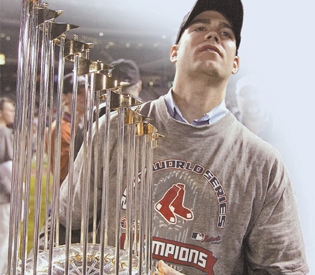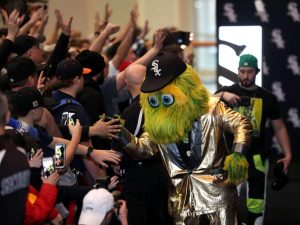
Starr’s 7 Questions: What does Theo Epstein’s return really mean for Red Sox?
Last week was a humdinger for the American League East.
Within a 48-hour period, the Baltimore Orioles came under new ownership, then traded for Milwaukee Brewers ace Corbin Burnes, adding the 2022 National League Cy Young to the front of their starting rotation.
The Burnes acquisition immediately makes the Orioles even more of a threat in more ways than one. It’s the dawn of a new era in Baltimore; the Orioles already had a top farm system, and now, they have owners who want to spend, too. Imagine that.
The Red Sox, meanwhile, had more of a mixed bag week. The Toronto Blue Jays signed Justin Turner to a one-year deal, eliminating the last vestiges of hope that the slugger could re-sign with Boston.
Principal owner John Henry also trended on X (formerly Twitter), because he showed up for a town hall regarding Fenway Sports Group’s new $3 billion deal with the PGA Tour. That the principal owner was willing to hold a microphone after being a no-show at his baseball team’s annual Winter Weekend less than two weeks prior infuriated Sox fans.
Then, on Friday, the most unexpected homecoming of Theo Epstein (who got his start as an Orioles intern, by the way). The former Sox GM is now a part-owner and senior advisor with FSG (subject to league approval).
It’s the feel-good story of the Sox offseason, though almost by default.
Here are my seven questions to ponder this week:
1. Why is Theo Epstein joining Fenway Sports Group?
Is it a PR move or will Epstein make a real difference for the Red Sox?
Likely a little bit of both. That he will increase his personal wealth through ownership is a given. Last winter, FSG crossed the $10 billion threshold in Forbes’ annual valuations, and ranked as the fourth-most valuable sports empire in the world.
However, in his new role as part-owner and senior advisor, Epstein is slated to work with the group’s various properties, including the floundering Liverpool FC – head coach Jürgen Klopp and his entire coaching staff are leaving after this season – and executive-coaching new Red Sox chief baseball officer Craig Breslow.
Boston knows firsthand what kind of impact Epstein can have. Let’s see how it plays out now that he’s an owner.
2. Why does golf suddenly matter more to Fenway Sports Group than their baseball team?
It’s certainly not the “full throttle” offseason chairman Tom Werner promised, and ownership’s dedication to miserliness looks even worse in light of their new $3 billion partnership with the PGA Tour.
It’s no coincidence that Epstein, a beloved, local hero, is returning at a time when FSG’s approval rating is underwater. As MassLive’s Chris Cotillo noted last week, “He was brought back into the fold, at least in part, due to Red Sox ownership privately acknowledging that they have, at times, not given the club the attention it has deserved in recent years as the FSG portfolio has rapidly grown.”
Did ownership think that was their own little secret? FSG’s purchase and investment in the Red Sox made amassing such an enormous portfolio possible, and yet it’s been clear for most of the last half-decade that the root of their enormous money tree has become an afterthought.
Epstein, who grew up a Sox fan in Brookline, will be tasked with winning back the fed-up Fenway Faithful, no small order these days.
3. Does this mean Theo Epstein doesn’t want to be MLB commissioner?
Until buying into FSG, Epstein had been with the league office since 2021, serving as a consultant to commissioner Rob Manfred. However, during the 99-day lockout two years ago, a high-ranking source told me that Epstein was “on a list of one” to replace Manfred, whose unpopularity with the public soared during the Houston Astros sign-stealing scandal and the lockout.
But with Manfred getting reelected last July – receiving a four-year extension to remain in charge until Jan. 25, 2029 – it makes sense that Epstein would pivot. It doesn’t mean he’s not interested in succeeding Manfred down the road.
He wouldn’t be the first owner to become commissioner. Manfred’s predecessor, Bud Selig, owned the Brewers before becoming commissioner, at which time, he transferred his ownership interest to his daughter. In 1992, a Texas Rangers owner named George W. Bush considered throwing his hat in the ring for commissioner, but went into politics, instead.
4. Did the Red Sox really ghost Justin Turner?
Justin Turner didn’t opt into the second year of his Red Sox contract, but that doesn’t mean he didn’t want to stay in Boston.
“Right when the season ended, I assumed that it would be a no-brainer,” he told the Boston Globe on Friday. He and his wife even extended their lease in order to remain in town.
Instead, Turner and his representatives had a hard time even getting the Red Sox “interested enough to engage in talks,” reported legendary Boston sportswriter Peter Gammons last week.
Some of that disconnect can be attributed to the front office turnover earlier in the offseason. The Red Sox had a more difficult time finding a replacement for Chaim Bloom than they expected; it took over six weeks from his mid-September firing, with several prospective candidates declining to even be interviewed.
Even so, this isn’t the first time the Red Sox have been less than polite in their handling of a former player. When he became a free agent after seven seasons in Boston, Brock Holt, who’d been one of the most dedicated Jimmy Fund captains in the long history of their Red Sox partnership, made it clear that he wanted to re-sign with the Red Sox and finish out his career with them. He said didn’t even get a phone call.
Is it so hard to pick up the phone and say, “Thanks for everything, we wish you the best?”
5. Why would anyone steal and destroy the Jackie Robinson statue?
Last week, the Wichita, Kansas fire department found the charred remnants of the Jackie Robinson statue, which had been stolen from McAdams Park on Jan. 25, smoldering in a trash can.
The theft was caught on surveillance: footage showed the vandals cutting down the life-size bronze rendering of Robinson and loading it into the bed of a truck, leaving only the feet behind on its plinth.
Thankfully, the heartless act of cruelty was met with kindness and generosity from the public and MLB. The original statue was the work of local artist and former firefighter John Parsons, who passed away a year after its 2021 installation, and the replacement will be made using his original mold. Last week, MLB announced that the league and all 30 clubs will be paying for the replacement, and GoFundMe started before MLB stepped in has also raised over $194,000.
6. With Bill Belichick gone, will the Patriots be as irrelevant as the Red Sox, or more relevant because people will want to see how the post-Belichick era unfolds?
Were I a betting woman, I’d say the Patriots will still garner more interest. The post-Tom Brady era has been rough so far. Will the post-Belichick era be any better?
7. Have you watched Tom Werner’s new show based on Celtics owner Wyc Grousbeck’s family?
I’ve been enjoying “Extended Family,” the new NBC show loosely based on Celtics owner Wyc Grousbeck and his blended family. Red Sox chairman Tom Werner is one of the executive producers.
“Extended Family” centers on a divorced couple inspired by Grousbeck’s wife Emilia Fazzalari and her ex-husband Tom Geyer, depicted on screen by Jon Cryer (Pretty in Pink, Two and a Half Men) and Abigail Spencer (Mad Men, Timeless). Spencer’s character is engaged to a fictionalized version of Grousbeck, played by Donald Faison (Scrubs, Clueless, Remember the Titans), while they all attempt to amicably coparent their two children, and navigate a new family reality.
While there are definitely some cheesy elements, “Extended Family” is a unique, modern take on divorce and life in an unconventional family. Tune in for Boston jokes and Celtics cameos.

